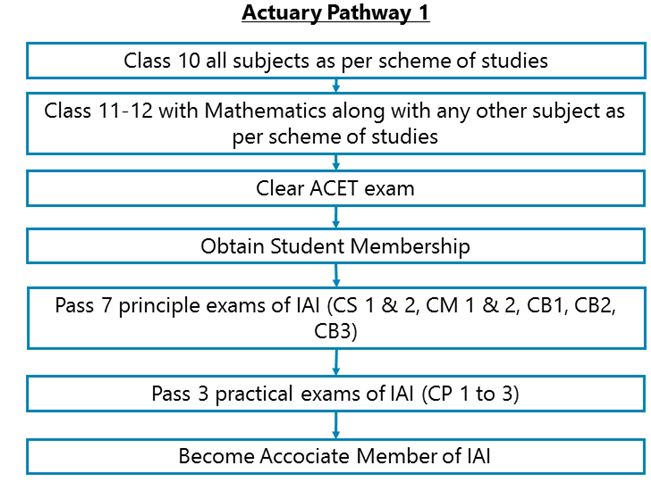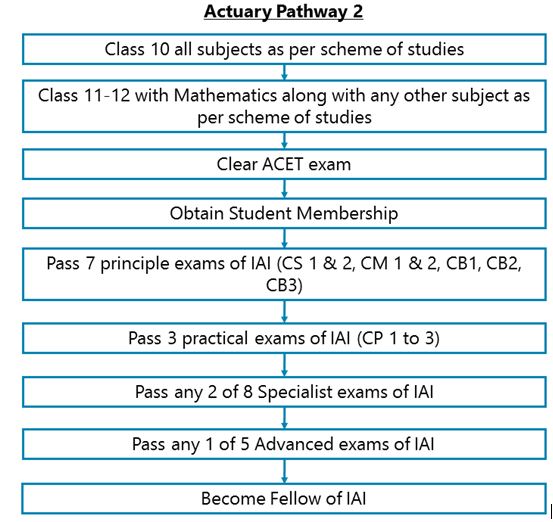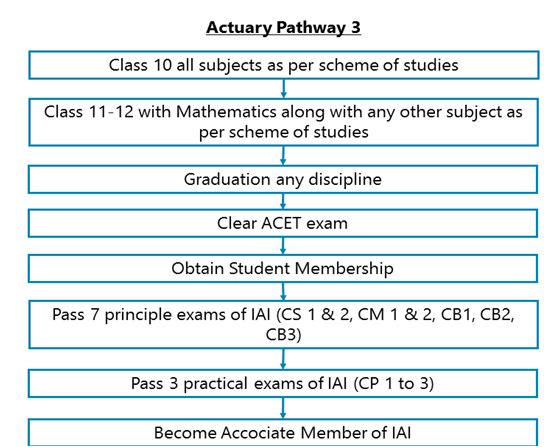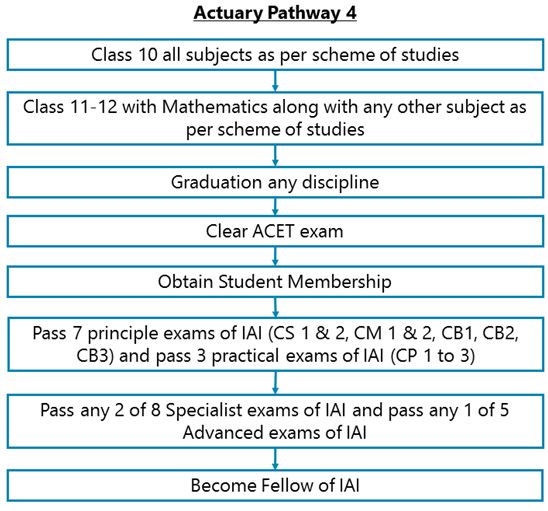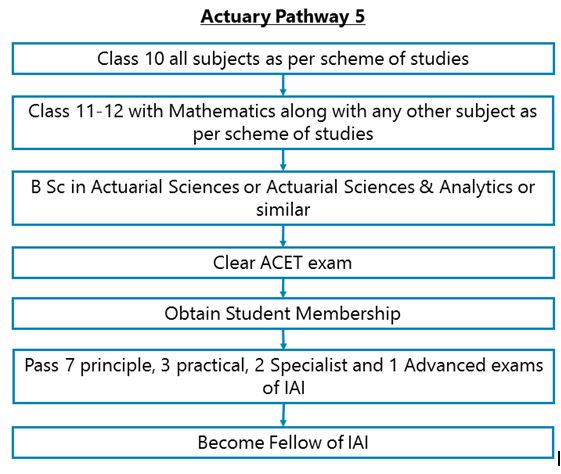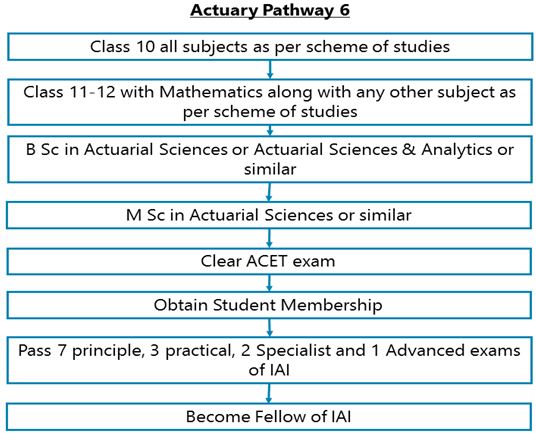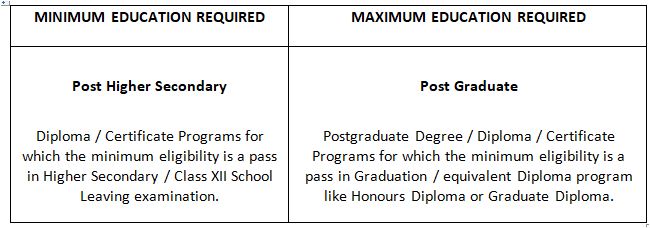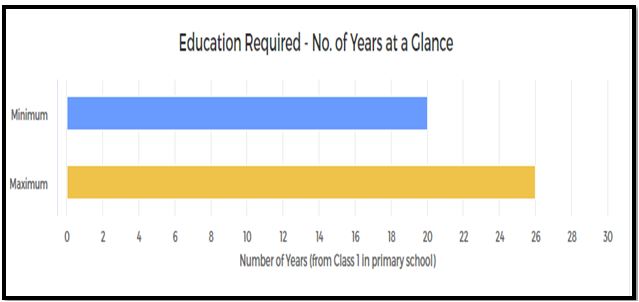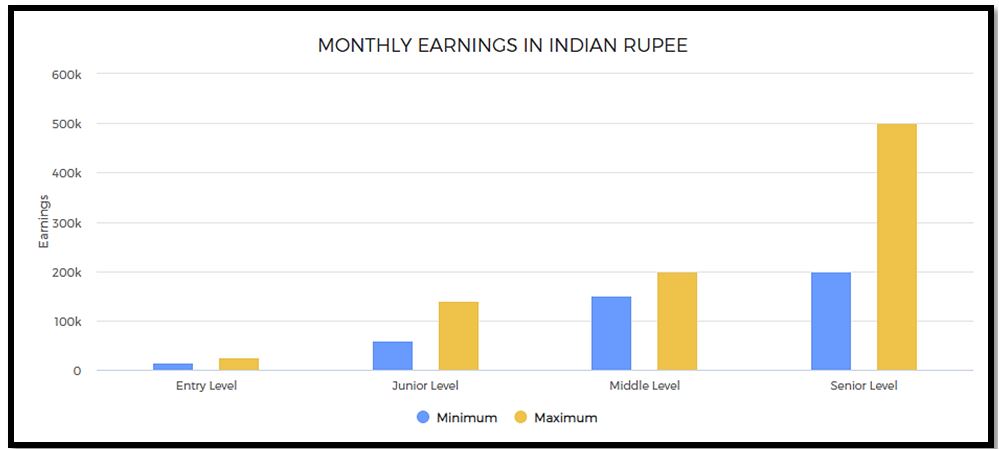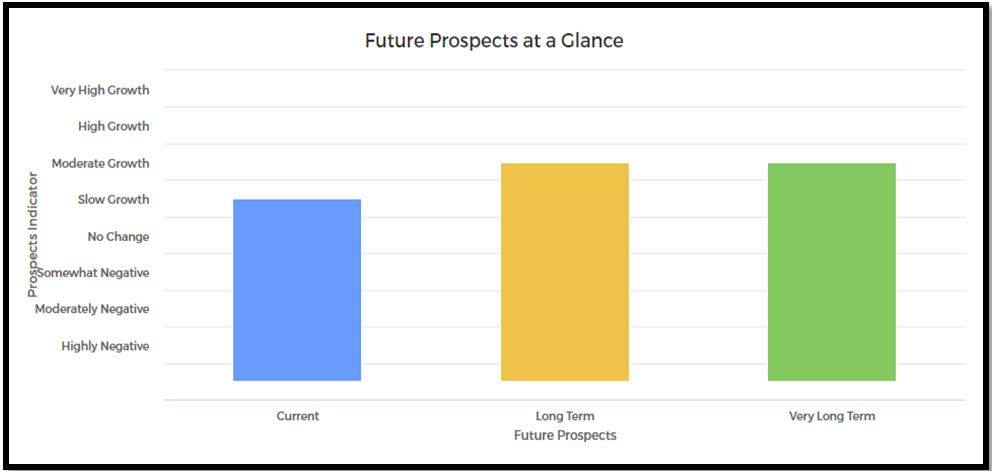Actuary
Entry Level Qualification
12
Career Fields
Business & Management
For Specially Abled






Career Entrance Exam
About Career
PARTICULARS | DESCRIPTION |
Name | Actuary |
Purpose | Risk Assessment |
Career Field | Business & Management |
Required Entrance Exam | CAT |
Average Salary | 150000 - 300000 Rs. Per Year |
Companies For You | Allianz, MetLife, Social Security Administration & Many More |
Who is Eligible | Class 12th Pass |
An Actuary is a specialist who generally works in the banking and financial field and measures and manages the risk and uncertainty around any investment, insurance, etc.. As an Actuary you would work with different mathematical and statistical tools, computer modelling and computer programmes to compute the risk involved in an investment or insurance. You will present risk analysis reports to your team so that they can use these reports to ascertain the premium rates in insurances, EMIs in the loan, etc. As an Actuary, you might be working with life insurance companies, pension funds, healthcare providers, investment banks, accountancy firms, management consultancies, etc.
You will work to provide a complete assessment of the financial security of the system while focussing on the complexity of the system.
Key roles and responsibilities
As an Actuary, depending on your field of specialisation, you would have the following roles and responsibilities:
1. You are required to calculate premium rates, cash reserves, liabilities, etc. to ensure full payments of future benefits.
2. You will be required to design and review insurance policies, annuity and pension plans. You will ensure financial soundness while calculating premiums.
3. You will help in determining company policies and explain complex financial matters to executives of companies, government officials, shareholders, policyholders and public.
4. Provide advice to clients on a contract basis, working as a consultant.
5. Analyse statistical information to estimate mortality, accident, sickness, disability, and retirement rates.
6. You will be designing the financial policies of the company and will also monitor funds that the company holds.
7. You will calculate and determine the interest rate for insurance policies for the public.
8. You will keep an eye on risks involved in insurance plans to minimize losses.
9. You will access any risk related to the financial planning of the company.
10. Keeping a check on insurance risks to minimize losses.
11. You will predict the occurrence of different illness (like cancer, heart diseases, etc.) among different groups of people to incorporate these risks in policy formation for insurance.
Career Entry Pathway
Class 10 all subjects as per scheme of studies – Class 11-12 with Mathematics along with any other subject as per scheme of studies – Pass ACET exam – Obtain Student Membership - Pass 7 principle exams of IAI (CS 1 & 2, CM 1 & 2, CB1, CB2, CB3) – Pass 3 practical exams of IAI (CP 1 to 3) – Become Associate Member of IAI
After completing Class 10 all subjects as per scheme of studies then Class 11-12 with Mathematics along with any other subject as per scheme of studies, you can directly start preparing for ACET. Appear for the exam and enter IAI as student member to begin with the subsequent sets of exams, both theoretical and practical. ACET is tough to crack so it is advisable to try the recommended books that IAI had listed on the website as well as practice the previous year’s question papers that are also published on IAI’s portal. After ACET, you will have to obtain student membership and clear 7 theoretical and 3 practical papers to become an Associate of IAI. These papers are further divided into Sections A, B, C etc. and one exam for one Section. However, most student members only take a few papers and start with their jobs and complete the rest of the papers whenever they get time while on their job.
Class 10 all subjects as per scheme of studies – Class 11-12 with Mathematics along with any other subject as per scheme of studies – Pass ACET exam – Obtain Student Membership - Pass 7 principle exams of IAI (CS 1 & 2, CM 1 & 2, CB1, CB2, CB3) – Pass 3 practical exams of IAI (CP 1 to 3) – Pass any 2 of 8 Specialist exams of IAI – Pass any 1 of 5 Advanced exams of IAI – Become Fellow of IAI
After completing Class 10 all subjects as per scheme of studies then Class 11-12 with Mathematics along with any other subject as per scheme of studies, you can directly start preparing for ACET. Appear for the exam and enter IAI as student member to begin with the subsequent sets of exams, both theoretical and practical. ACET is tough to crack so it is advisable to try the recommended books that IAI had listed on the website as well as practice the previous year’s question papers that are also published on IAI’s portal. After ACET, you will have to obtain student membership and clear 13 papers to become a Fellow of IAI. These papers are further divided into Sections A, B, C etc. and one exam for one Section. However, most student members only take a few papers and start with their jobs and complete the rest of the papers whenever they get time while on their job.
Class 10 all subjects as per scheme of studies – Class 11-12 with Mathematics along with any other subject as per scheme of studies – Graduation any discipline - Pass ACET exam – Obtain Student Membership - Pass 7 principle exams of IAI (CS 1 & 2, CM 1 & 2, CB1, CB2, CB3) – Pass 3 practical exams of IAI (CP 1 to 3) – Become Associate Member of IAI
After completing your graduation in any discipline, you can directly start preparing for ACET. Appear for the exam and enter IAI as student member to begin with the subsequent sets of exams, both theoretical and practical. Graduation can be in any discipline but preferable if Mathematics, Statistics, Engineering, Economics, Accounts / Commerce as subsequent studies during the course after ACET will be various applications of Mathematics. You are equally eligible for ACET even if you are not from these streams but have a strong interest in the subject. After ACET, you will have to obtain student membership and clear 7 theoretical and 3 practical papers to become an Associate of IAI. These papers are further divided into Sections A, B, C etc. and one exam for one Section. However, most student members only take a few papers and start with their jobs and complete the rest of the papers whenever they get time while on their job.
Class 10 all subjects as per scheme of studies – Class 11-12 with Mathematics along with any other subject as per scheme of studies – Graduation any discipline - Pass ACET exam – Obtain Student Membership - Pass 7 principle exams of IAI (CS 1 & 2, CM 1 & 2, CB1, CB2, CB3) – Pass 3 practical exams of IAI (CP 1 to 3) - Pass any 2 of 8 Specialist exams of IAI – Pass any 1 of 5 Advanced exams of IAI – Become Fellow of IAI
After completing your graduation in any discipline, you can directly start preparing for ACET. Appear for the exam and enter IAI as student member to begin with the subsequent sets of exams, both theoretical and practical. Graduation can be in any discipline but preferable if Mathematics, Statistics, Engineering, Economics, Accounts / Commerce as subsequent studies during the course after ACET will be various applications of Mathematics. You are equally eligible for ACET even if you are not from these streams but have a strong interest in the subject. After ACET, you will have to obtain student membership and clear 13 papers to become a Fellow of IAI. These papers are further divided into Sections A, B, C etc. and one exam for one Section. However, most student members only take a few papers and start with their jobs and complete the rest of the papers whenever they get time while on their job.
Class 10 all subjects as per scheme of studies – Class 11-12 with Mathematics along with any other subject as per scheme of studies – B Sc in Actuarial Sciences or Actuarial Sciences & Analytics or similar – ACET Exam – Student Membership – Pass 7 principle, 3 practical, 2 Specialist and 1 Advanced exams of IAI – Become Fellow of IAI
After completing Class 11-12 with Mathematics along with any other subject as per scheme of studies, you may complete your Bachelor degree in Actuarial Sciences or Actuarial Sciences & Analytics or similar. Then you can appear for ACET and enter IAI as student member to begin with the subsequent sets of exams, both theoretical and practical. After ACET, you will have to obtain student membership and clear 13 papers to become a Fellow of IAI. These papers are further divided into Sections A, B, C etc. and one exam for one Section. However, most student members only take a few papers and start with their jobs and complete the rest of the papers whenever they get time while on their job. Remember, no one is exempt from ACET or eligible for direct entry into IAI as student member even if you have completed your graduation in the same subjects. Except certified candidates with cross-national professional qualifications in this area, everyone has to clear ACET first.
Class 10 all subjects as per scheme of studies – Class 11-12 with Mathematics along with any other subject as per scheme of studies – B Sc in Actuarial Sciences or Actuarial Sciences & Analytics or similar – M Sc in Actuarial Sciences or similar - ACET Exam – Student Membership – Pass 7 principle, 3 practical, 2 Specialist and 1 Advanced exams of IAI – Become Fellow of IAI
After completing both Bachelor degree and Master degree in Actuarial Sciences or Actuarial Sciences & Analytics or similar, you have to appear for ACET to become a Student Member of IAI and clear 13 papers to become a Fellow of IAI. These papers are further divided into Sections A, B, C etc. and one exam for one Section. However, most student members only take a few papers and start with their jobs and complete the rest of the papers whenever they get time while on their job. Remember, no one is exempt from ACET or eligible for direct entry into IAI as student member even if you have completed your post graduation in the same subjects. Except certified candidates with cross-national professional qualifications in this area, everyone has to clear ACET first.
Required Qualification & Competencies
The minimum required qualification for ACET exam is a pass in Class 11-12. You can also apply for it before your board exam results are announced.
Without Mathematics fundamentals, it is impossible to become an Actuary. As IAI and similar statutory institutes are looking at a decreasing number of student applications, they are doing these maneuvers.
Actuarial Science is very high level of Financial Mathematics or Mathematical Finance. Those who haven't done the full course of Maths in 11-12th can forget about ever clearing any Maths exam of IAI.
i. You will need to pass ACET (Actuarial Common Entrance Test) exam conducted by IAI and some subsequent exams to practice as a qualified Actuary in India. IAI is the globally recognized Institute of Actuaries of India.
ii. After passing ACET, you will have to become a Student Member of IAI and appear for all the subsequent exam papers by self-tutoring yourself with the help of recommended books and study material furnished by IAI on their web portal. You will be called a student of IAI, however IAI will not be your teacher, for it will only conduct the exams!
iii. You can appear for IAI ACET examination even from outside India. The list of exam centers outside India are .http://www.actuariesindia.org/subMenu.aspx?id=218&val=ACET_Test_Centres
iv. The subsequent exams after ACET include 7 principle papers, 3 practical application based papers, a choice of any 2 out of 8 specialist papers and a choice of 1 out of 5 advanced papers. Each of these papers will be further divided into Sections A, B, C etc. and one exam for each section. However, no one finishes all exams at one go and then starts with a job. All of it at one go takes at least 8 years to complete.
v. Typically, students pass a couple of IAI exams after ACET and start looking for a job. You can continue with the other papers while on the job. Currently, there are 1426 student members who still have 14 exams to write (to attain fellowship status) but are already on their respective jobs and as in March 2019, there are only 439 Fellows who have passed from IAI after completing all sets of all exams.
vi. The sequence of these exams, that you have to pass as a student of IAI after ACET, is not pre-determined. You will be notified about the next set of your exams after you successfully pass ACET.
vii. You can appear for other examinations conducted by organizations of other countries such as South Africa (Actuarial Society of South Africa), US and UK (Institute and Faculty of Actuaries-IFoA). US has two governing bodies in this field viz. Casualty Actuarial Society CAS (non-life: property and casualty insurance) and Society of Actuaries (life, health, pensions and retirement). If you have passed in at least 3 subjects under the examination systems of these 3 countries, you are exempt from ACET and can continue with the subsequent exams.
viii. Note that, if you even pass 2 CAS (US) exams, you are eligible for jobs with top-notch recruiters in India. There is a total of 9 CAS exams that one can write. Typically, students (both in India and US) opt for a job after the first 3 CAS exams and continue studying for the rest while on their job.
ix. Under the IAI system, there are many exemptions that you can enjoy for 1 or more papers in the entire length of the IAI syllabus after ACET. This means you may not have to appear for all the exam papers to be a Fellow of IAI. These exemptions are for:
1. Students who have passed B Stat / M Stat from ISI Kolkata
2. Students who hold pass certificates for more than 1 exam from CAS, IFoA (Institute and Faculty of Actuaries, UK) and Actuarial Society of South Africa
3. Graduates from select universities in UK viz. Bristol, Cambridge, Heriot-Watt, Imperial College, Lancaster, Leicester, London School of Economics, Manchester, Nottingham, Queens University Belfast, Said Business School (Oxford), Sterling, Warwick, Birmingham, Cass Business School, East Anglia, Imperial College Business School, Kent, Leeds, Newcastle, Oxford, Queen Mary (University of London), Southampton, and Swansea.
4. Qualified members or associate members of ICAI (professional chartered accountants)
x. Note that, to avail the waiver / exemption policies for any particular exam paper under the IAI system, you will have to pay a fee per paper depending on the number of papers you are exempt from. The minimum exemption fee for a paper is Rs. 2500.
You can also opt for B Sc and M Sc in Actuarial Sciences / Actuarial Sciences & Analytics but you will have to obtain membership of IAI under all circumstances through ACET followed by some subsequent exams and then practice as a registered Actuary.
COMPETENCIES REQUIRED
1. Interests
Enterprising: You should have interests for Enterprising Occupations. Enterprising occupations involve taking initiatives, initiating actions, and planning to achieve goals, often business goals. These involve gathering resources and leading people to get things done. These require decision making, risk taking and action orientation.
Conventional: You should have interests for Conventional Occupations. Conventional occupations involve repetitive and routine tasks as well as fixed processes or procedures for getting things done. These occupations involve working more with data, systems, and procedures and less with ideas or creativity.
2. Abilities
Abstract Reasoning: The ability to understand ideas which are not expressed in words or numbers; the ability to understand concepts which are not clearly expressed verbally or otherwise.
Deductive Reasoning: The ability to apply general rules and common logic to specific problems to produce answers that are logical and make sense. For example, understanding the reasons behind an event or a situation using general rules and common logic.
Flexibility of Closure: The ability to identify or detect a pattern (a figure, object, word, or sound) that is hidden among other distracting materials.
Inductive Reasoning: The ability to combine pieces of information from various sources, concepts, and theories to form general rules or conclusions. For example, analysing various events or situations to come out with a set of rules or conclusions.
Information Ordering: The ability to arrange things or actions in a certain order or pattern according to a specific rule or set of rules (e.g., patterns of numbers, letters, words, pictures, mathematical operations).
Numerical Reasoning: The ability to add, subtract, multiply, divide, and perform other basic numerical calculations correctly.
Oral Comprehension: The ability to listen to and understand information and ideas presented through spoken words and sentences.
Oral Expression: The ability to communicate information and ideas in speaking so others will understand.
Originality: The ability to come up with unusual or innovative ideas about a given topic or situation, or to develop creative ways to solve a problem.
Problem Sensitivity: The ability to tell when something is wrong or is likely to go wrong. It does not involve solving the problem, only recognizing there is a problem.
Selective Attention: The ability to concentrate on a task over a long period of time without being distracted.
Speed of Closure: The ability to quickly make sense of, combine, and organize information into meaningful patterns.
Verbal Reasoning: The ability to think and reason with words; the ability to reason out ideas expressed in words.
Written Comprehension: The ability to read and understand information and ideas presented in writing.
Written Expression: The ability to communicate information and ideas in writing so others will understand.
3. Knowledge
Accounting: Knowledge of various principles and methods for maintaining records of commercial and financial transactions and records, preparing various reports and statements, ensuring compliance with commercial and business laws and rules of a country, etc.
Business Management: Knowledge of managing a business which involves planning of what to do, organising resources and people, leading and supervising work activities of people, and monitoring performances of people as well as performance of business. This includes knowledge of marketing, finance, human resources management, operations management, etc.
Economics: Knowledge of economic principles and practices; understanding how various resources such as land, labour and capital are used; how market demands rise and fall; how a country collects and spends money; and similar other economic issues and situations.
4. Skills
Active Learning: Focused and continuous learning from various sources of information, observation and otherwise for application in getting work done.
Coordination: Skills in working together with other people to get things done.
Critical Thinking: Skills in analysis of complex situations, using of logic and reasoning to understand the situations and take appropriate actions or make interpretations and inferences.
Judgment and Decision Making: Skills in considering pros and cons of various decision alternatives; considering costs and benefits; taking appropriate and suitable decisions.
Problem Solving: Skills in analysis and understanding of problems, evaluating various options to solve the problems and using the best option to solve the problems.
Reading Comprehension: Skills in understanding written sentences and paragraphs in work related documents.
Service Orientation: Skills in or keen interest to help and assist people.
Time Management: Skills in prioritizing work, managing time effectively.
Writing: Skills in communicating effectively in writing as appropriate for the needs of the readers.
5. Personality
1. You are always or mostly organised in your day-to-day life and activities.
2. You are always or mostly careful about your actions and behaviour.
3. You are always or mostly disciplined in your action and behaviour.
4. You are always calm or generally remain calm in most situations.
5. You always feel secure in your surroundings and in most situations.
6. You can always act independently or could do so in most situations.
7. You trust others sometimes but not always.
8. You act independently sometimes but do not do so in some other times.
9. You are always practical or in most situations.
10. You always or mostly prefer to stick within a routine or carry out routine and repetitive activities.
Career - Job Opportunities & Profiles
1. If you have cleared the stage 1 and 2 of the certification examinations (Core Principle and Core Practice series of subjects) and has become an Associate Member of the IAI, then most of the actuary firms will hire you as an Actuarial intern or Actuarial Assistant.
2. If you are interested in a consulting role, then you may start as an Actuary (Analyst) after becoming a Fellow of the IAI.
3. Some of you will be hired as Assistant Manager (Actuary) in insurance companies after become an Associate Member of the IAI.
4. You may get opportunity to join LIC or other public sector insurance companies in India in the position of Assistant Administration Officer (Actuary).
You can find job opportunities at the following facilities:
1. As an actuary, you might be working with life insurance companies, pension funds, healthcare providers, investment banks, accountancy firms, management consultancies, etc
2. Government and private insurance companies like Life Insurance India, Apollo Insurance, Tata AIA Life, Aditya Birla Sunlife Insurance, etc.
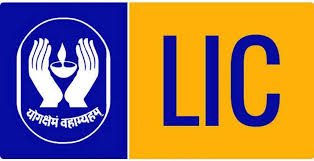

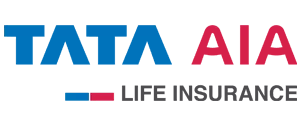
3. Pension funds like LIC pension fund, SBI Life Saral Pension fund, Bajaj Allianz, Reliance Smart Pension, etc.
4. Healthcare providers like Tata AIG Medicare, ICICI Medical Insurance, etc.
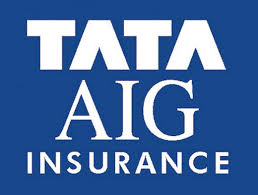

5. Investment Banks like Barclays Capital, B.N.P. Paribas, etc.
Work Environment
As an actuary, you will be working mostly in a job with a normal 8 hours working. However, your work environment can be stressful at times as you will be dealing in the capital, premiums, loans, EMIs, etc. You will be required to perform several financial modellings that can consume a lot of time. Also, you will have pressure to accurately predict rates.
CAREER GROWTH
1. If you start your career as Actuary (Analyst), then with time you will be promoted to Associate Analyst and then Senior Actuarial Analyst (Pricing) and then Consultant (Actuary) and then Senior Consultant.
2. If you start your career as Actuarial (Intern), then you will be promoted to Actuarial Assistant (Insurance)/ Actuarial Assistant (Operations) etc. and then Manager.
3. If you join as an assistant manager (Actuary), then you will be promoted to Manager (Actuary), Senior Manager (Actuary)/ Senior Manager (Product & Pricing)/ Senior Manager (Modelling & Insurance) and then General Manager.
4. if you join a public sector insurance company in India as an Assistant Administrative Officer Actuary (AAO-Actuary), your next promotion will be as a Divisional Administrative Officer-Actuary and then as an Assistant General Manager. Thereafter you can progress as a Deputy General Manager, General Manager, Senior General Manager, Deputy Director, and Director.
Salary Offered
1. At the entry level, you can join as an intern (actuary) with a basic salary of Rs. 10,000 to 25,000. As an assistant manager (actuary) you will be earning anything between Rs. 50,000 to 1,00,000 per month. As an analyst, you will be earning anything between Rs. 20,000 to 70,000 per month.
2. At the junior level with a work experience of 2-6 years, you would be earning anything between Rs. 60,000 to 1,40,000 per month.
3. At the middle level with an experience of 10-12 years, you would be earning anything between Rs. 1,50,000 to 2,00,000 per month.
4. At the senior level of over 15 years of work experience, you would be earning anything between Rs. 2,00,000 to 5,00,000 per month.
Monthly Earnings In Indian Rupees
1. Entry level: 0 - 2 years of work experience
2. Junior Level: From 1 to 12 years of work experience
3. Mid-Level: From 5 to 20+ years of work experience
4. Senior Level: From 10 to 25+ years of work experience (there could be exceptions in some high-end technical, financial, engineering, creative, management, sports, and other careers; also in the near future, people will reach these levels much faster in many careers and in some careers, these levels will have no meaning as those careers will be completely tech skill driven such as even now, there is almost no level in a Cyber Security Expert’s job)
Work Activities
Analysing and interpreting data and information: Analysis of data and information to find facts, trends, reasons behind situations, etc.; interpretation of data to aid in decision making.
Calculating and computing: Calculating or computing using various mathematical formula and functions using computers or otherwise; doing financial or commercial calculations or computations.
Communicating with co-workers and others: Communicating with people in writing, verbally or otherwise inside your workplace and various other people who have professional relationships with your place of work including vendors, government officials, etc. or with people at large.
Decision making and problem solving: Analysis of data and information; evaluation of alternative decisions and results of decisions; taking the right decisions and solving problems.
Estimating quantity, cost, time and resources: Estimating sizes, volumes, distance, and quantity; estimating and determining time, costs, and resources; estimating materials required to perform a task.
Getting Information and learning: Observing, hearing, reading, using computers, or otherwise obtaining information and learning from it.
Inspecting situations, events, and people: Inspecting situations, events and people to understand the reasons and causes for the situation or events to happen; inspecting people to understand reasons behind their behaviour and actions.
Organising, planning and prioritising tasks: Planning and organising tasks in order to achieve work goals; prioritising tasks to achieve goals and making the best use of the time available.
Providing advices and consultation to others: Giving advices or consultation to others about various issues, conceptual matters, know-hows, scientific matters, products or services.
Strategic planning: Developing visions and goals, developing strategies and action plans for achieving visions and goals.
Updating and using relevant knowledge: Keeping updated with the latest knowledge relevant to your fields of work and use of the relevant knowledge in getting things done.
Using computers for work: Using computers for day-to-day office work; using computer software for various applications in day-to-day professional work; entering data and process information; for writing.
Working in a team: Working in a team of people; developing team; maintaining professional relationships among team members.
Future Prospects
Presently around 24 life insurance companies and 39 non-life insurance companies operate in India. Together these companies accounted for Rs. 5.53 trillion gross premiums paid in 2018. Around Rs. 4.58 trillion was paid for life insurance and rest for non-life insurance. In the 2019 financial year (till January 19), life insurance premiums increased by 3.9% and non-life insurance by 12.65%. With such mind-boggling numbers, insurance is just 3.69% of GDP of India, this indicates a big potential in this segment. So, while job prospect for actuaries may be moderate in coming few years, due to still low growth rate, they are bound to find better prospects may be in next 5 years when insurance penetration will increase with the faster growth rate.
Future Prospects At A Glance

